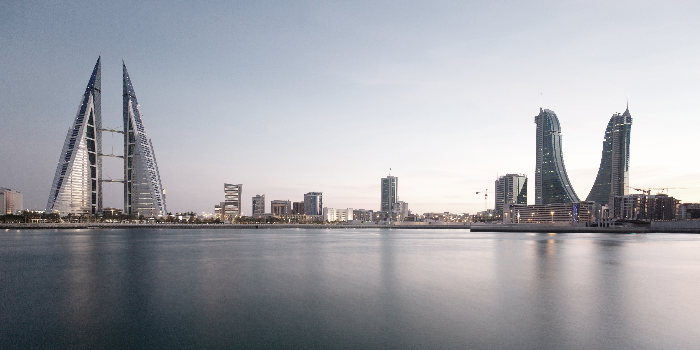
Are you looking for a place to invest your money and grow your business? Do you want to enjoy high returns, low taxes and a great quality of life? If yes, then look no further than Bahrain, the powerhouse of the Middle East.
Bahrain is a small island nation with a big vision. It has just been ranked Number One globally in Financial Attractiveness on the AIRINC Global 150 Cities Index 2023 for the fifth consecutive year. It finished above Zurich, George Town (Cayman Islands), Geneva and Riyadh.
The Index evaluates the best cities in the world for the financial and business opportunities they offer and the living standards they deliver. This means that Bahrain provides the highest salaries, the lowest taxes, the most affordable living costs and the best quality of life among the 150 cities ranked worldwide.
The Kingdom of Bahrain’s growing economy offers exciting investment opportunities within a supportive business environment designed to help your company flourish for years to come. Its pro-innovation business policies and laws give businesses of all sizes the opportunity to thrive and to export directly across the Gulf Cooperation Council (GCC) and the surrounding region.
As well as offering competitive operating costs and unparalleled financial freedom, Bahrain is also a hub for growth, innovation and diversification. It has a highly skilled and educated workforce, a business-friendly environment and a vibrant culture.
The Bahrain Economic Development Board (EDB) has responsibility for attracting investment into the Kingdom and supporting initiatives that enhance the investment climate. It works with the government and both current and prospective investors to ensure that Bahrain’s investment climate is attractive and to identify where further economic growth opportunities exist.
This proactive approach is amply demonstrated by a number of initiatives and policies that have been introduced specifically to attract and support investors, including:
The Golden Licence
This is a special licence awarded to large-impact investment projects that align with Bahrain’s Economic Recovery Plan (ERP). The ERP is a strategic plan that aims to grow and diversify the national economy by focusing on key sectors such as financial services, information communications and technology (ICT), manufacturing, logistics and tourism.
Team Bahrain Approach
This is a unique programme where government bodies work closely with businesses and regulators to explore opportunities and create optimal conditions for business growth. The Team Bahrain Approach ensures that investors have easy access to information, guidance and support throughout their journey in Bahrain.
StartUp Bahrain
StartUp Bahrain is a community initiative that brings together entrepreneurs, corporates, investors, incubators, educational institutions, and the Bahrain Government, to promote startup culture in Bahrain.
FinTech Regulatory Sandbox
The FinTech Regulatory Sandbox is operated onshore by the Central Bank of Bahrain (CBB) to enable companies to test their technology-based solutions for up to a year under supervision.
Bahrain FinTech Bay
The Bahrain FinTech Bay (BFB) is a public-private partnership between the EDB and the Singapore-based FinTech Consortium that is dedicated to enabling, fostering and ultimately building a complete fintech ecosystem.
Economic Freedom
Bahrain is ranked first in the Middle East and North Africa (MENA) region for Financial Freedom (7th globally) and Investment Freedom (8th globally) on the Heritage Foundation’s 2023 Index of Economic Freedom. Bahrain has a highly favourable tax regime with 0% corporate and personal income tax, no restrictions on repatriation of capital, profits or dividends, and 100% foreign ownership across most sectors, with no free zone restrictions.
A place to live your life
“Bahrain is not just a place to invest your money. It’s also a place to live your life,” said Nabil Khoury, Managing Partner of Sovereign Trust Consultancy. “Bahrain has a rich history, a diverse culture and a well-deserved reputation for hospitality. Bahrain has something for everyone: from ancient forts and museums to modern malls and skyscrapers, from traditional souks and festivals to trendy cafes and nightlife, from sandy beaches and water sports to green parks and golf courses.
“Bahrain is the place where you can have it all: financial success, business growth and personal happiness. Don’t miss this opportunity to join the Bahraini success story. Invest in Bahrain today and enjoy the benefits tomorrow.”
Sovereign will provide comprehensive advice and support to investors and start-ups to set up their operations in Bahrain in the right way. Bahrain offers a range of vehicles through which to do business – the choice will be governed by the nature and size of the business, as well as the requirements of the investors. All types of Bahraini company give the shareholders or the directors a Residence Permit in Bahrain.
Having set up and registered your company in Bahrain, the Sovereign Business Hub will provide start-ups with physical space with advanced ICT capacity, available on flexible terms, together with access to business guidance, counselling and mentoring.
The AIRINC Global 150 Cities Index is a ranking of 150 cities based on financial attractiveness, physical attractiveness, and cultural attractiveness. The index is produced by AIRINC, a global leader in providing data, advice and technology for global mobility.
